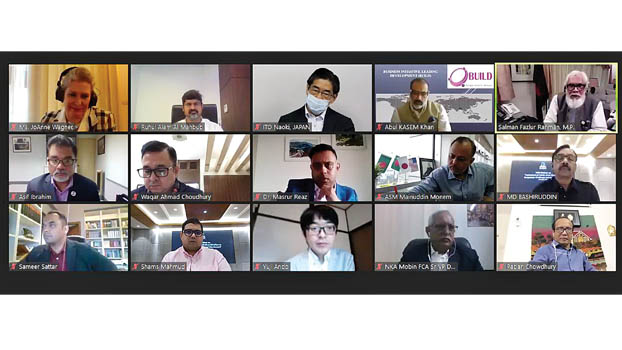Regional ties aligning with ASEAN, BIG-B, BRI stressed to boost FDI

Business Desk
Experts and trade body leaders in a webinar on Saturday put stress on regional cooperation aligning with ASEAN, BIG-B, and Belt and Road initiative (BRI) to boost FDI and multilateral economic interest.
To improve investment climate they also suggested policy actions and and reforms like access to finance, regulatory reforms, faster pace of mega infrastructure development, simplification of tax regime, developing FDI policy and export diversification.
Dhaka Chamber of Commerce & Industry (DCCI) organized the webinar on “Implications of COVID-19 on FDI inflow to Bangladesh: Challenges and Way Forward” on Saturday.
Salman Fazlur Rahman, MP, Private Industry and Investment Adviser to the Prime Minister joined the webinar as the chief guest while Executive Chairman of Bangladesh Export Zones Authority (BEZA) Paban Chowdhury joined as special guest. Ambassador of Japan to Bangladesh ITO Naoki joined as guest of honour.
While addressing, Salman Fazlur Rahman said that reduction of tax to the investors will ease them to come in but on the other hand our tax to GDP ratio is lowest in this region.
"We need to widen our tax net to ease burden on the existing tax payers. Government is working on policy reforms and this initiative will attract more FDI. Almost in all top level of the government the realization has come that we need to change the mindset to reform", he added.
Chairman of Policy Exchange Dr. M Masrur Reaz presented the keynote paper. DCCI President Shams Mahmud moderated the webinar.
DCCI President Shams Mahmud in his welcome remarks said that the 7th five-year plan targeted USD 9.6 billion FDI inflow annually by FY2020, but we remained behind the target. The FDI to GDP ratio in Bangladesh is 1.2% less than India, Sri Lanka, Vietnam and Cambodia. Out of total FDI stock, the country received highest USD 3.8 billion FDI in Gas and Petroleum sector where USA is the largest investor with USD 3.60 billion followed by the UK, South Korea, the Netherlands, China and Japan.
According to World Investment Report 2020, Global FDI flow is projected to decrease by 40% in 2020 to USD1 trillion from USD1.54 trillion in 2019 due to COVID-19. Dr. M Masrur Reaz, Chairman, Policy Exchange in his keynote presentation said that according to UNCTAD, global FDI will plunge 40% in 2020 and another 5% to 10% will drop in 2021. Global FDI will fall short to USD 1 trillion benchmark for the first time since 2005. Moreover developing countries of Asia may face lower investment flows up to 45%, he said.
President, AmCham, Syed Ershad Ahmed said that we want hasstle free support from NBR. He also said that we need to modernize some acts like custom Act, bankruptcy act. The port infrastructure should be enhanced, he said. US FDI to Bangladesh is still high. He said due to covid 19-led pandemic, most of FDI flows to health, pharmaceutical and ICT sector.
Asif Ibrahim, Chairman, Chittagong Stock Exchange & former President said we need to encourage investment in energy and infrastructure sector. At present NRBs can invest in mutual funds in Bangladesh which is a good sign, he said.
Government’s plan of establishing 100 SEZs will boost FDI, he added. Public-private partnership and resolving policy constraints will lead us to a newer hight, he said.
Yuji Ando, JETRO Country Representative & President, JBCCI said that JETRO is facilitating investment from Japan.
He said at present 310 Japanese companies are in Bangladesh and the quantity is increasing. Japanese FDI has decreased to 33% from January-june this year, he told. Tax issues, registration process, investmet climate, lack of adequate logistics and required regulatory reforms are some of the challenges for FDI attraction, he added.
Ambassador of Japan to Bangladesh ITO Naoki said Japanese are interested to invest in Bangladesh. In 2019 Japanese FDI to Asia was USD 57 billion but Bangladesh’s share was just 0.09%. In the regional connectivity and under Big B initiative, Japan’s collaboration will continue, he said.
Executive Chairman, BEZA, Paban Chowdhury said foreign investors as well as joint ventures in agroprocessing food sector in EZs will get 20% cash incentives. We are discussing with NBR about the bond license and hopefully its tenure may be extended for at least 3 years instead of 1 year, he informed. Motorcycle registration fees will also significantly be reduced to less than 10%, he said.



